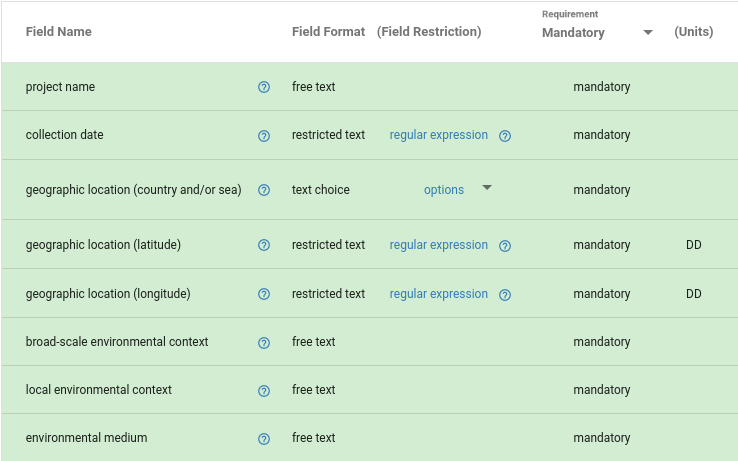Data Repositories & Metadata
Fields, Standards & Minimal Requirements
2024-07-18
Learning objectives
- recall at least two mandatory metadata fields
- name at least one metadata standards used in the life sciences
- identify relevant data repository
Metadata fields
Metadata fields
- A column header expects one or more cell values
- A metadata field expects one or more values
| Metadata field | Type of constraint |
|---|---|
| description | free-text |
| geolocation | coordinates |
| biome | ontology term |
Metadata standards
Metadata standards
Fields are organized into coherent metadata standard for a given type of data
- e.g., genomes, soil samples
They are built and maintained by a combination of stakeholders
- e.g., users community, data repositories
Standards expectations
Metadata standards (should) indicate for each field:
the description of the metadata field
the level of requirements (mandatory, recommended, optional)
the cardinality, that is the range of expected values for the metadata field
a persistent identifier for the field
Exercise: Metadata standards
Task:
Look-up a standard that match your model system or type of sample
Identify the mandatory metadata fields
Compare with your neighbor
Minimal requirements
The set of mandatory fields is sometimes referred to as the minimal requirements.
Filling out these requirements and all the optional metadata fields would be ideal (if only possible) but is time-consuming
Exercise: Requirements
Task:
- Given only the mandatory fields, do you think you could recontextualise the data properly?
- List your arguments in the pad.

ENA Browser for host-associated metadata requirements (ERC00013)
as much as possible, as little as necessary
Working FAIRly takes time and effort1
How much metadata is necessary to understand your research and to enable (inter-) disciplinary research?
Data repositories
Data repositories
Curated and well-described that stays on your hard drive is of limited interest to the scientific community.
National and international efforts exist to create and maintain data repositories for the life sciences.
For nucleotide sequence data, the INSDC integrate and mirrors data repositories from three regions:
USA with the NCBI
Europe with the EMBL-EBI
Japan with the DDBJ
Exercise: Data repositories
Task
Find out which repository could suit your data using the wizard
Report the repository in the pad

